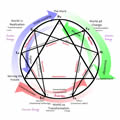Some Hints about Reasoning
2015-01-06
Reasoning is a skill. It's not a natural ability for most of us. In fact most of us have never learned to reason. One of the components of reasoning is the ability to think, and most of us can't even do that consistently and effectively. Nevertheless, we can, occasionally do both. We just have to be aware that a special effort and a special development of this skill is necessary. And as with most skills, the more we practice it the better we get.
Reasoning is most useful when we want to change or transform some habit, attitude, conditioning or way of thinking that we've had for a very long time. Consequently we can expect considerable resistance from our physical, mental or emotional centers that have a vested interest in maintaining the old ways.
Reasoning can be tested by laying out our reasoning process to someone else that is trustworthy, intelligent, insightful, honest, and patient. It would also help if this person knew something about reasoning.
Reasoning is not just thinking and logic. It also takes into consideration the practical aspects of a situation, including any emotional component. It uses wisdom, intuition and creativity to augment and support logic, thinking, and facts.
Reasoning takes courage. If we are not ready for a painful struggle and a significant sacrifice of the "old ways", we need not bother.
Reasoning is empowering. No one, outside of ourselves, can stop us from reasoning. The "reward" for going through the process is freedom.
- John Hutcherson's blog
- Log in to post comments

Comments
emotional bits
Agreed. Personally, I would emphasize your point that "[r]easoning is not just thinking and logic." (Someone else might need to discover or emphasize a different aspect). I grew up in a "real school" that hung its hat on reasoning. (Top notch liberal arts schools, colleges, and universities). For a long time, I prided myself on being open-minded and being able to follow a line of thought fearlessly wherever it might lead. But I lacked heart, and, consequently, my reasoning was uncentered. Without kindness and compassion to guide me, my lines of thought easily went astray. Martin Heidegger was the greatest philosopher of the twentieth century, and he wore a Nazi uniform.